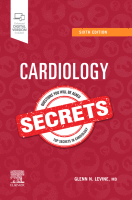Physical Address
304 North Cardinal St.
Dorchester Center, MA 02124

1 Who are “the elderly”? The average US life expectancy is 76 years for men and 81 years for women. Elderly in the context of most clinical guidelines refers to patients age 65 years or older. There is variation arising…

1 What is the pathophysiology of COVID-19 and its effects on the cardiovascular system? Coronavirus Disease 2019 (COVID-19) is caused by the severe acute respiratory syndrome coronavirus 2 (SARS-CoV-2). The virus infects its host via the spike subunit of SARS-CoV-2,…

1 How common is cocaine use in the United States? Cocaine is one of the most commonly used illicit drugs in the United States. Between 2011 and 2015, there was an increased prevalence of cocaine use in individuals aged 12…

1 What is type I versus type II cardiotoxicity? Type I drugs cause irreversible cell loss and cumulative dose-related cardiotoxicity. Anthracyclines are type I drugs. Clinical manifestations of irreversible damage may not present for years owing to compensatory mechanisms. Stress…

1 What is the leading cause of mortality in patients with rheumatoid arthritis (RA) and what are the most common cardiac manifestations of RA? Ischemic heart disease is the leading cause of mortality in patients with RA. Compared to the…

1 How have the cardiac manifestations of human immunodeficiency virus changed over the years? Until the early 1990s, cardiac manifestations of human immunodeficiency virus (HIV) and associated acquired immunodeficiency syndrome (AIDS) frequently included overt and often acute viral and inflammatory…

1 What is the difference between physical activity and exercise? Physical activity is skeletal muscle contraction causing body movement that requires energy use. Exercise is a type of planned physical activity that is performed to attain or maintain physical fitness.…

1 Why is smoking cessation of fundamental importance in the management of the cardiac patient? Smoking cessation is the most important of the modifiable risk factors for cardiovascular disease. The products of tobacco smoke contribute directly, and distinctly, to the…

1 What is the current global burden of diabetes, and what is its impact on the epidemiology of cardiovascular disease? The International Diabetes Federation has estimated that approximately 1 in 11 adults (415 million adults) has diabetes mellitus globally. The…

1 Who should be screened for dyslipidemias and when should a cholesterol panel be checked? As per the 2018 American College of Cardiology/American Heart Association (ACC/AHA) guidelines, all adults aged 20 years or older should undergo screening with either a…